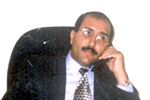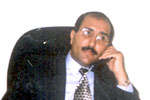
Cultural Institutions and Yemeni Intellectual -III [Archives:2000/51/Culture]
December 18 2000
Imad Al-Saqqaf
Taiz Bureau Chief
In the last interview with Dr. Abdul-Wali Al-Shamiri, Chairman of Ibda Foundation for Art and Culture emphasized that there were many difficulties that hinder the progress of art and literature among which is the lack of financial and moral support for Yemeni creative talents. He criticized the cultural institutions for not communicating with each other. He was optimistic about the future of culture, art and literature in Yemen. He also emphasized that our customs, traditions and other reasons made the Yemeni woman isolated from literary, cultural and artistic field.
This part focuses on other two pioneer cultural institutions to give a brief account about. They are Bakatheer Establishment for Literature and Arts and the General Authority of Books.
First, YT interviewed Chairman of Bakatheer establishment, Mr. Abdullah Mohammed Al-Khyari
Q: Could you give us a brief account on the establishment and its objectives?
A: The objectives of the establishment are:
1- Contributing to and promoting all forms of literature.
2- Contributing to preservation of the entity of the Yemeni society, deepening awareness of the Islamic civilization in the society and overcoming the effects of the cultural onslaught.
3- Paying attention to various Yemeni arts, encouraging young writers and talents and publishing their works so that the ambitions of the Yemeni nation come true.
4- Establishing and consolidating cultural, scientific and artistic intercommunication between other establishments and attentively studying other modern human cultures to promote the Yemeni civilization.
Q: Whats your comment on the large number of cultural establishments and having no palpable benefit?
A: I am optimistic and there is hope that the performance of those establishments would improve and the society would experience their benefit in the future. With all this immense culture, heritage, large area, strategic location and different civilizations that were in it, Yemen must have more cultural establishments. If the economic conditions improve and the conditions of society get better, this will be reflected on culture and art because for the time being most people are wrapped up in securing basic needs and consider culture and arts as luxury.
Q: Why does the establishment choose to intercommunicate with some particular authors? Does the establishment have affiliation to any party?
A: With no exception, we intercommunicate with all authors and there are many different authors in the establishment. Honestly, I dont know their party affiliations. Besides, The culture and arts that we have will enable us to go past parties. Culture always towers above narrow-minded partisan affiliations. Honest, high artistic works will always have their sway. These are our standards by which we can serve the issues of the Yemeni nation and regain its role and fulfill its ambitions.
Then YT interviewed Khaled Abdullah Al-Rowiashan, Chairman of the General Authority of Books.

Q: Would you kindly give us an idea about the Authority?
A: The General Authority of Books is a governmental authority that is supervised by the Ministry of Culture. It is meant for publishing cultural books, establishing and directing public libraries.
Q: Do culture and creative productions exist in the presence of those too many cultural institutions?
A: The spread of various cultural institutions during the 90s in Yemen is a good phenomenon though most of them are concerned with the media. Along with the new research centers, they are politically influenced and thus culture becomes just a chassis.
Q: With whom do you intercommunicate? Does the Authority belong to any particular party?
A: We intercommunicate with all writers. What proves this is the publications by the Authority and the libraries in different governorates. The Authority does not belong to any party. It is a governmental general cultural authority.
Q: Do you really evaluate the literary works when publishing them? What are the standards that you follow to evaluate them? For whom do you publish?
A: Yes, and the standards depend on fitness and importance of the subject. That is to say, the language of the subject must be correct and the idea proper. A committee of the most notable cultured and sophisticated people decides whether the subjects are fit for publishing.
Q: What are your concerns and ambitions?
A: I think that our biggest concern and ambitions are to cover the governorates and big cities with libraries for public to read. We have already opened 10 libraries during the last two years. Underway are some libraries to be opened in other cities. We are aspiring at publishing The Modern Yemeni Artistic Heritage in a thicker edition to reflect the civilized and ingenious face of this country.
——
[archive-e:51-v:2000-y:2000-d:2000-12-18-p:./2000/iss51/culture.htm]


